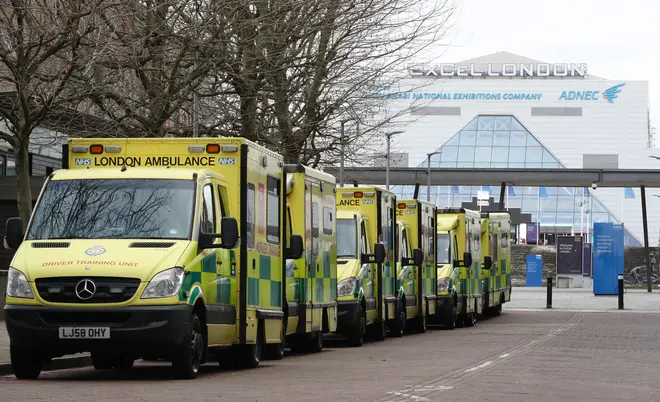
Vanessa Feltz 3pm - 6pm
10 January 2021, 09:52 | Updated: 10 January 2021, 13:11

The NHS is facing the "most dangerous situation anyone can remember" as Covid deaths and hospital admissions reach record levels, Professor Chris Whitty has warned.
England's chief medical officer (CMO) once again urged people to stay at home unless absolutely necessary in order to prevent further avoidable deaths.
His warning comes after the government announced it would roll out regular rapid testing for people without coronavirus symptoms in the next week.
The move will allow people who are unable to work from home during the third national lockdown, such as police officers, supermarket workers and taxi drivers, to take regular tests.
Prof Whitty thanked the public for everything they have done so far to curb the spread of Covid-19 and offered hope by acknowledging the rollout of the various vaccines.
However, he repeated the words of other experts who have said it will be weeks before the jabs begin reducing the number of people being admitted to NHS trusts.
Read more: Mass testing for asymptomatic people to be rolled out
Watch: London patients queue for Covid vaccine in near-freezing temperatures

New TV campaign urges public to stay at home
"Hospitals are always busy in winter, but the NHS in some parts of the country is currently facing the most dangerous situation anyone can remember," the CMO wrote in the Sunday Times.
"If the virus continues on this trajectory, hospitals will be in real difficulties, and soon.
"Staff-to-patient ratios - already stretched - will become unacceptable even in intensive care."
England has reached a record-high number of people in hospital with coronavirus, with many trusts surpassing the number seen at the peak of the first wave.
On Saturday, the total number of people to die in the UK within 28 days of testing positive for Covid-19 topped 80,000, while lab-confirmed cases hit more than three million.
Read more: Most Covid patients have at least one symptom six months later - study
Read more: 16 arrested during anti-lockdown protest in south London

Peter Openshaw: Government not following advice in its entirety
The Department of Health and Social Care (DHSC) said its expansion of the community testing programme to everyone without the virus is "crucial given that around one in three people" who contract the virus are asymptomatic.
Lateral flow tests that can give results in around half an hour will be central to the rollout, which will be "expanded to cover all 317 local authorities", DHSC said.
Health Secretary Matt Hancock said targeted asymptomatic testing followed by isolation is "highly effective in breaking chains of transmission".
However, doctor Angela Raffle, a consultant in public health with the University of Bristol Medical School, said increasing lateral flow testing "is very worrying".

Huge queue for vaccines seen in south-east London
"Any benefit from finding symptomless cases will be outweighed by the many more infectious cases that are missed by these tests," she said.
"Already, outbreaks are known to have occurred because people have been falsely reassured by a negative lateral flow result, leading them to attend work whilst having symptoms."
Meanwhile, as the vaccine rollout gathers pace, more than half a million over-80s are due to receive invitations this week to sign up to receive a jab.
The first 130,000 invitations were due to arrive over the weekend, as the government strives to meet its target of offering inoculations to almost 14 million vulnerable people in the UK by mid-February.
Prime Minister Boris Johnson said: "There are deeply challenging weeks ahead, but today signals another significant step forward in the race to protect the public, and defeat the virus."

ICU Doctor tells LBC London's hospitals are at breaking point
Elsewhere, some experts have branded the current lockdown measures not strict enough, in the face of the more transmissible variant which has spread rapidly in many parts of the country.
Susan Michie, a professor of health psychology at University College London who participates in Independent Sage, questioned whether restrictions need to be tighter still.
"We have to get to a situation if we're going to get on top of this virus and prevent tens of thousands of avoidable deaths which we are looking at over the next few weeks, we absolutely have to get right back to where we were in March, unfortunately," she told the BBC.
"Which means that everybody's at home and you don't have many people on the streets. But that does need to be accompanied by the Government giving good financial support to everybody, including those people in the gig economy and with precarious jobs, not just those on salaries as happened last time."
Listen & subscribe: Global Player | Apple Podcasts | Google Podcasts | Spotify